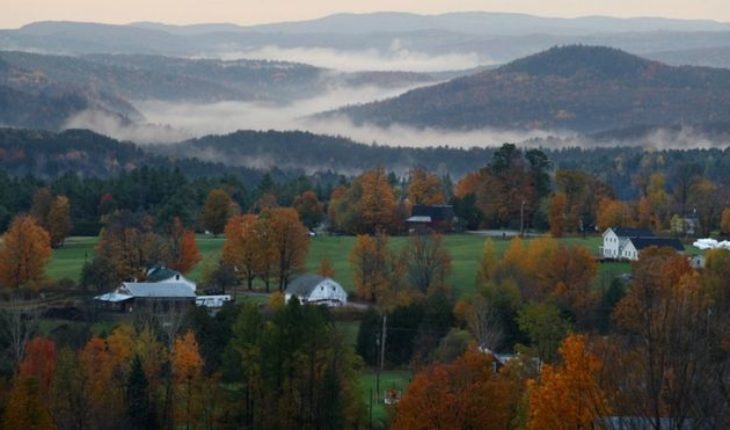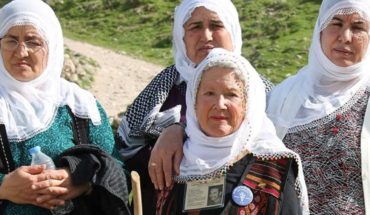President Donald Trump said the United States is ” Full “and that is why you cannot allow the entry of new migrants. But citizens in a country mostly rural state say they cannot disagree more.
40 years ago, Curtiss Reed went to Vermont to ski on his vacation and was caught in a storm. He had to sleep in a Dunkin’ Donut shop for two nights before he could get to a friend’s house. That gave him a lot of time to enjoy the natural beauty of Vermont.
“I spent three weeks skiing, eating, drinking and I was convinced that this was a paradise,” says Reed, who is a consultant for the Association for Equity and Diversity in Vermont. “Six months later, I moved here.”
But since then Reed has lived the closure of many stores in the city center all over the state, raising taxes and stagnating wages.
Reed says that this is because historically Vermont has only tried to attract only one type of resident.
Curtiss Reed, a consultant with the Association for Equity and Diversity in Vermont, believes that the State should change its attitude to foreigners who want to work there.
White and heterosexual men
Although President Donald Trump assured earlier this month during a visit to the U.S. southern border that “the country is full,” Reed says that if Vermont wants to improve its economy, it needs its population to grow.
But the state has two problems: it does not have enough people to do the jobs available, and it does not know how to attract people from a different demographic of the current population, which is white by 95%.
Under Trump’s administration policies, fewer refugees, immigrants, and temporary visa workers enter the state.
Joan Goldstein, Commissioner of the Vermont Department of Economic Development, says the race is underway. The states of the country compete to attract new residents, he says.
“I know that sounds very mercenary, but we’re in a competitive market,” he says. “Vermont’s marketing strategy for decades was to attract heterosexual white men with family income of US $120,000 or more. That population is shrinking. ”
Vermont made a big difference in its approach, says Goldstein. Instead of just trying to attract business to the state, they now woo people.
“Other states asked us how we did this because they are also interested in the same types of tactics,” he says. “Although this is a starting point, it is likely to be more popular soon.”
Immigration barriers
This year, Vermont began giving $10,000 to certain workers to move to remote parts of the state.
“There was a great deal of interest from outside the U.S. with the initial publicity success we had,” says Joan Goldstein. “I would say that about 25% of the people who consult us are from other countries.”
But so far none of the 26 people approved for the subsidy are refugees or foreigners.
That may be because there are barriers for immigrants who want to work in the state.
Chris Winters, Under Secretary of state, says it has been difficult for several people to get their credentials from other places to qualify in Vermont.
“Then you begin to unfairly keep people out of the professions for which they are qualified,” says Winters.
Stowe, Vermont, has been a ski paradise for years.
“We can really do a lot more in Vermont to improve access to our workforce.”
This month, the Vermont legislature passed a bill that would make it easier for many immigrants to transfer their qualifications so they can get certification for jobs in the state. The governor is expected to sign it.
The state is also taking other steps, such as hiring a senior racial equity and diversity officer.
Winters hopes that these measures will help attract, among others, many new and diverse immigrants from Canada to work in Vermont.
He believes that diversity is key to keeping the millenials in the state, and points out to his own daughter is leaving Vermont to go to college in another state because she feels the population is not diverse enough.
“I think it’s unfortunate to hear statements like ‘ America is full ‘ or ‘ There’s no more room in the inn, ‘ says Winters.” I can assure you there’s plenty of room in Vermont. ”
Discrimination
Marita Caneda, of Burlington’s migrant Justice group, says, for his part, that Vermont still has a long way to go before being cozy for immigrants and minorities.
“If you are going to promote a site, you should take into account the people who are already there and who struggle every day to get ahead, as happens in the dairy industry,” says Cane.
Many people working in that industry in Vermont are undocumented.
Cruz Alberto Sánchez-Pérez arrived in Vermont from Mexico in 2015 to join two of his brothers working in dairy farms.
They used to pay them less than the minimum wage and did not have a day off, until they were organized to demand better wages and benefits.
It is still a tense environment for people who look like him, says Sanchez-Perez, even though he has just obtained asylum in the United States.
In addition to the Immigration and customs Law, the U.S. Border Patrol has jurisdiction at 160 kilometers from the federal border, which includes much of Vermont, and is constantly alert to find undocumented people trying to cross the border with Canada.
Vermont has also had some racial problems.
“In the last three or four years, we’ve had several unfortunate incidents,” Reed says.
In 2017, the mayor of the city of Rutland campaigned to attract Syrian refugees in order to revitalize the local economy.
The rejection he faced attracted national attention and his defeat was considered a referendum on refugee resettlement.
Last year, Kiah Morris, Vermont’s only African-American state senator, resigned from office because her family was being harassed.
The U.S.-Canadian border is under strict surveillance by the Border Patrol.
And in Stowe, North Vermont, there were also cries and racial slurs against teachers and children who were not white in a camp.
“There are many places in the state where these incidents occurred,” Reed says.
And he adds that an image of the place is created as a discriminatory site where no one wants to go, so state and local governments have to make an active campaign against it, he says.
For the consultant it is necessary to direct messages specifically to immigrants and to minority communities, because not all of them obtain information in the same way as whites.
Vermont could advertise through social networks, in the community known as Black Twitter, which focuses on issues of interest to the American black community. Or it could be broadcast in Spanish.
“Start with an invitation,” Reed says. “And if only a small population is being invited, then the result of this is that economic growth and prosperity are in jeopardy.”
Some Vermonters ensure that you live a tense environment if you are an immigrant.





